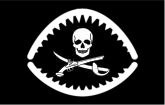
Originally Posted by
csadn

Well, there's this monumental screwup on the French side's part [from _Forte_ link]: "At 12:15, Forte opened fire with a few shots, which were left unanswered until she came down the side of Sybille, at which point the British frigate delivered a full broadside, turned about and raked her with a second broadside. In the confusion of the battle, the gun crew of Forte were not advised that Sybille had circled around to starboard, and they kept firing their port guns at a ship whose silouhette could be seen through the smoke, but which was actually one of the prizes. After some time, the mistake was realised and the starboard battery was manned; however, as part of the crew of Forte had been dispatched to man her prizes, her forecastle guns could not be used."
It helps to shoot at the ship which is shooting back....






 Reply With Quote
Reply With Quote









Bookmarks